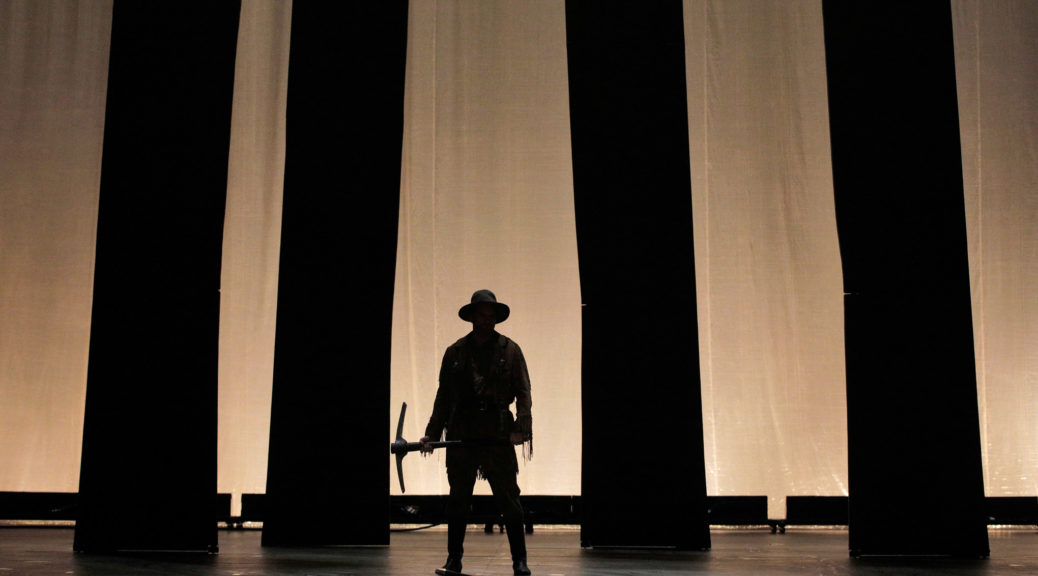
NEW OPERA VIEWS UNDERBELLY OF GOLD RUSH – John Adams’ Moving Premiere, Warts and All
In this his fourth opera, composer John Adams reminds me of a football game that is 0-0 at the half, but ends up in a furious 42-41 score. Given major revisions for act one, this could become the resounding opera of our times.
Adams’ brutally candid historical opera premiere retells the California Gold Rush miners’ days, this time with accounts of hardship, poverty, mob violence, lynchings and racial prejudice. Whether or not he truly struck gold here, once again he has a controversial opera that will fuel discussion all around and predictably draw protests, particularly from those sensing critiques of both wiped-clean California history and our current administration’s anti-minority stances.
The work now desperately needs a dramatic act-one finale to provide momentum. You don’t believe it? How about the 20 percent or so of the sold-out crowd I caught one evening vanishing during intermission? The creative minds at work here narrate a lot about the mining-camp milieu but, until the last 80 minutes, forget about the conflict and passion that opera does best.
Forget the tidy schoolroom tales of manifest destiny and strike-it-rich rewards for hard work. Here is the soft underbelly of those conflict-ridden times where instant injustice intruded with guns and nooses in assault. Major credit for the voluminous archival research backing up the opus goes to frequent Adams collaborator, librettist-director Peter Sellars, incorporating both song texts and narrations from the past. Just check your weapons at the door, please.
Trumpeted in advance back east as America’s most significant opera premiere of the season, Adams’ must-hear opus “Girls of the Golden West” was launched by the San Francisco Opera Nov.21, to play later in Dallas and Amsterdam as part of the co-commission. Despite the name similarity, it is about as similar to the romantic Puccini thematic forerunner as Barbary-Coast San Francisco was to Renaissance Florence. It’s nitty-gritty frontier America, with white gloves off, work gloves on.
The music is deft, tonal, and subdued enough to let the voices shine through attractively. The familiar Adams style is mellower than in his recent instrumental pieces, carrying the long narratives in the first half, veering at times toward Bernstein’s jazzy, Broadway style and the Americana of “Appalachian Spring.” It bares its teeth effectively in the later violent scenes that are the meat and potatoes of the drama, with the volatile miners providing the night’s musical high points through the electric male choruses.
Narrations and introductions dominate the first half, largely from the documented letters of witness Dame Shirley, a fine writer with poetic bent. The one love scene (rare in Adams operas) plays out, but only in a reenacted retelling. Singularly lacking is some theatrical conflict or epic question to propel you through the intermission. If the first half is love and awakening, the second is hate and demise.
The stunning female triumvirate of the Caucasian Shirley, the Chinese prostitute Ah Sing, and the Latina Josefa, carry the opera right into the blood-curdling second half, where harmonious celebration gives way to mob rule, racial bias, mutilation and lynching of a woman who kills to avoid rape. Strong arias spotlight the hearts of Josefa, the housewife-aspiring prostitute and the fugitive slave/cowboy Ned.
Opening-night tensions and tautness no doubt hurt the seven principals’ voices, with only the baritone of flamboyant anti-hero Paul Appleby (Joe) fully unreeled on Nov. 21. Of note among the stars-to-be were soprano Julia Bullock (Shirley), mezzo J’Nai Bridges (Josefa), Davone Tines (Ned) and Elliot Madore (Josefa’s companion Ramon). Playing Lady MacBeth in a staging, Bullock was blood-curdling. Grant Gershon was the animated conductor, and David Gropman designed sets as if in a 19th-century theater, with rolling panoramic backdrops and drop-down redwoods in a quaint re-creation.
LUMINARIES—Seen in the audience opening night were conductor Michael Tilson Thomas, Sellars, Adams and SFO General Director Matthew Shilvock. Also anticipated were Dallas Opera representatives and notable East Coast music critics, prior to the end of the run.
Adams’ must-hear world premiere “Girls of the Golden West,” two acts in English (and some Spanish), at the S.F.Opera, Nov. 21 till Dec. 10; three-and-a-quarter hours. For SFO info: (415) 864-3330 , or go online.